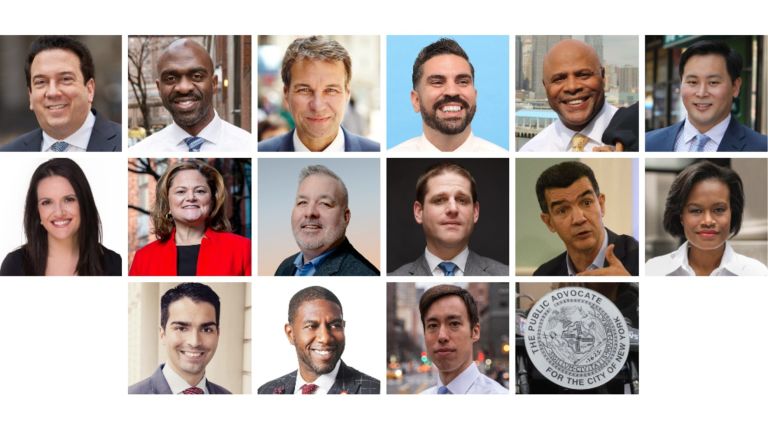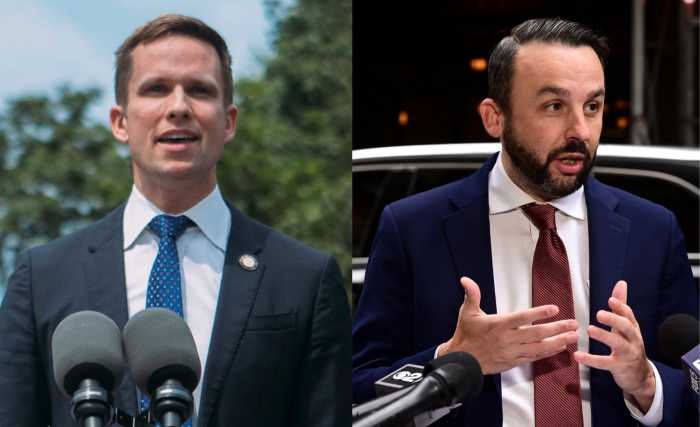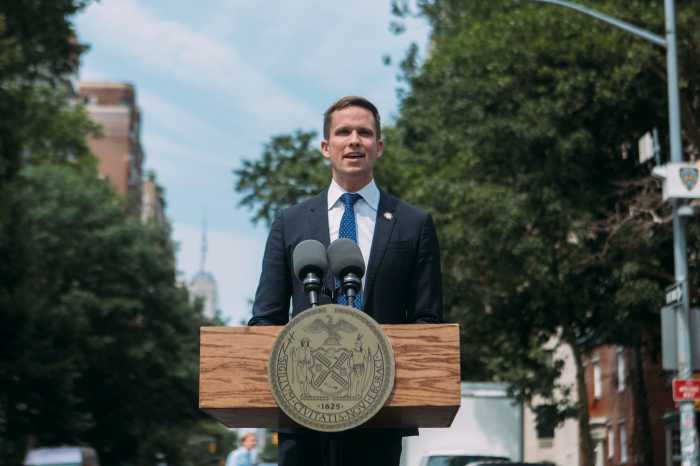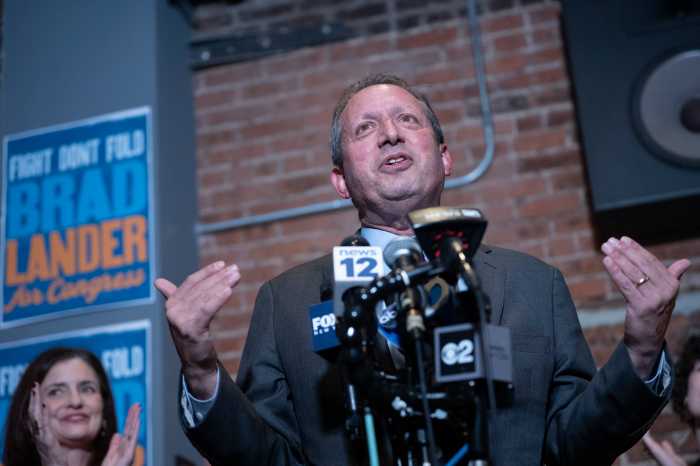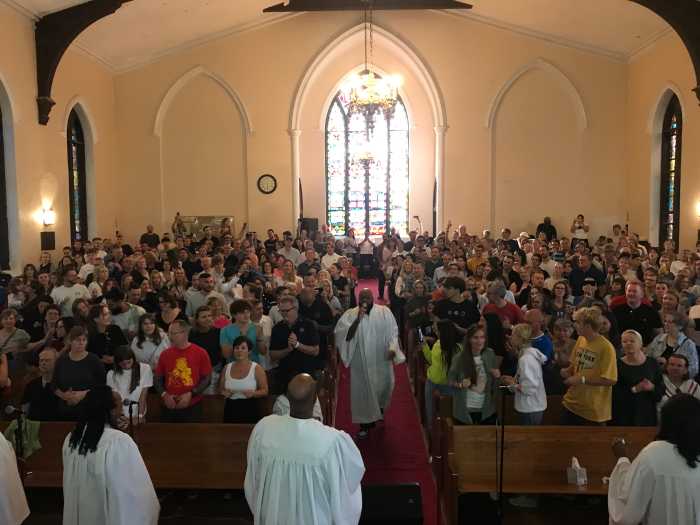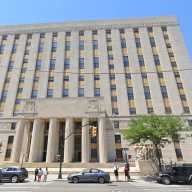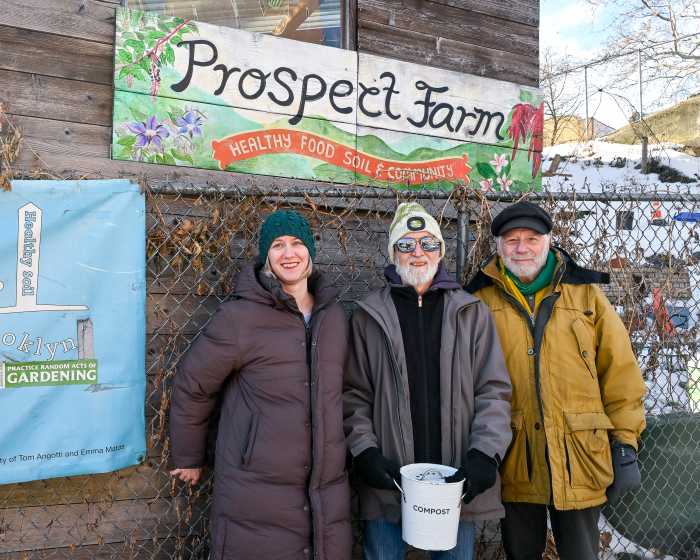
A daunting 16 candidates, including current and former elected officials, attorneys and activists, are vying to be the next New York City public advocate.
Polls opened at 6 a.m. Tuesday for the special election to fill the watchdog role, which was left vacant upon the election of Letitia James as state attorney general in 2018. The public advocate is the second-highest ranking elected official in the city and would take over if the mayor is temporarily unable to handle the responsibilities of the office.
The winner will serve as public advocate until at least Dec. 31, 2019, but there will be a primary in June and a general election in November for the balance of James’ term.
There are 17 names on the ballot Tuesday, but one candidate ended her campaign in January. amNewYork asked the other 16 candidates to complete a questionnaire to outline their priorities, qualifications and how they would help tenants who live in the city’s beleaguered public housing system.
Scroll down to learn more about the candidates who responded to the questionnaire.
Manny Alicandro
What would be your first action after taking office as public advocate?
First priority is to declare a public emergency on the homelessness and transit issues and begin working across agencies to develop and deploy a plan to solve these issues without destroying communities like the current de Blasio plans are, and without making false promises that won’t solve the L train and MTA issues.
What makes you the most qualified candidate to represent New Yorkers as the public advocate? What sets you apart from the other candidates?
I’m an outsider who has no ties to the old guard, so I have no problem reaching across the aisle to get work done for the good of all New Yorkers. I bring regulatory connections and administrative experience to actually get things done and get federal funding for New York projects. I get things done, I don’t have patience for grandstanding and PR stunts.
Yes or No: Are you interested in running for mayor in 2021?
I’m running for public advocate — that’s the office I’m concerned about. Fixing the MTA, tackling the BitLicense issue and working on NYCHA and homelessness are 100 percent my focus.
In light of the federal government’s increased oversight of NYCHA, what will you do as public advocate to help residents?
I plan to work with (Department of Housing and Urban Development Regional Administrator) Lynne Patton and (HUD Secretary) Ben Carson to bring in funds and solutions, as well as tackle the scaffolding, mold and heat issues. We’ll use technology to help ensure inspections and repairs are done accurately and thoroughly and perform a top-to-bottom audit. It won’t be business as usual.
Michael Blake
What would be your first action after taking office as public advocate?
Public transit. There is no transition period in this special election, so the next public advocate needs to be ready to go on day one. My first action will be to demand a permanent seat on the MTA board where I will be able to pursue immediate fixes to train and bus delays, reject unnecessary and costly construction proposals, and fight fare increases because of inadequate service, and identify underserved areas for transit investment. Transportation isn’t just about getting from one place to another. I believe it’s a basic right. It is about getting to your first day at a new school or a new job on time. New York subways are failing us. Some train lines are on time only 40 percent of the time. And the less money you earn, the longer your commute. This is unacceptable, and New Yorkers cannot wait any longer.
What makes you the most qualified candidate to represent New Yorkers as the public advocate? What sets you apart from the other candidates?
I am running as a committed and seasoned public servant, with 13 years of national, state and local experience in government. I have a track record of fighting and delivering. I helped secure increased funding for NYCHA, to making New York the only state to participate in “My Brother’s Keeper,” delivering $56 million in funding for education and career preparation for young men and boys of color, winning faster payments to women and minority-owned businesses who lack access to credit and can’t afford to wait to be paid. I am a uniter, not a divider, and am not afraid to tell the truth and do what is right. As a Bronx native of Jamaican descent, from a union household, an alumnus of the Obama White House, a brother of Alpha Phi Alpha, and as the honorary national co-chair of New Leaders Council, I have a strong, citywide organizational foundation, and with support from local leaders in Central Brooklyn and endorsements across all parts of the city, I believe I am best-positioned for a path to victory in this highly competitive race.
Yes or No: Are you interested in running for mayor in 2021?
No — the people of New York need clear, focused leadership now.
In light of the federal government’s increased oversight of NYCHA, what will you do as public advocate to help residents?
The announcement of a federal takeover provides a fresh opportunity for the city, state and federal government to improve NYCHA’s living conditions. While it is unimaginable and disappointing, we have no choice but to move forward in solving this humanitarian crisis together. Therefore, we demand a significant amount of federal and state funding be allocated to remedy the situation. We also demand that Mayor (Bill) de Blasio release the entire report on lead paint findings. We need independent leadership who will put the basic human rights of NYCHA residents first.
I will monitor and fight any efforts that might privatize public housing, endangering affordable housing for NYCHA residents. I will also fight for greater transparency of NYCHA work orders, progress and completion data so that we can all celebrate progress and hold NYCHA accountable where residents are waiting too long for repairs. As public advocate I will create a NYCHA Advisory Committee to elevate systemic issues and suggest solutions that will enable the public advocate to ensure the needs of public housing residents are met.
David Eisenbach
What would be your first action after taking office as public advocate?
Appoint an anti-rezoning advocate to the City Planning Commission.
What makes you the most qualified candidate to represent New Yorkers as the public advocate? What sets you apart from the other candidates?
I have been leading the fight for the Small Business Jobs Survival Act (SBJSA), which has been thwarted by the Real Estate Board of NY for 33 years. This year we are finally going to pass it thanks to (City Council) Speaker Corey Johnson and my work as President of Friends of SBJSA. I know how to take on big real estate and pass legislation that will Save Small Business and Our Neighborhoods.
Yes or No: Are you interested in running for mayor in 2021?
Absolutely not — any public advocate with mayoral ambitions will not do the job, which is to call out the most powerful people in NYC, including the real estate industry.
In light of the federal government’s increased oversight of NYCHA, what will you do as public advocate to help residents?
I have been shining a spotlight on the horrible conditions in NYCHA since I ran for public advocate in 2017 as an anti-de Blasio Democrat. I have called for an independent audit of NYCHA to uncover waste, fraud and corruption and I will demand the prosecution of anyone employed by NYCHA including private contractors, who have been diverting resources from the residents for their own personal gain.
Rafeal Espinal
What would be your first action after taking office as public advocate?
My first priority would be establishing offices and staff in all parts of New York City, so it’s easy for people to come to the public advocate’s office to raise issues and get them addressed. It will be the first time the public advocate has done that.
What makes you the most qualified candidate to represent New Yorkers as the public advocate? What sets you apart from the other candidates?
I understand how the city and state work because I’ve been a City Council member and a State Assembly member.
In the City Council, I have stood up for the communities in my district that have suffered from historical disinvestment. In my first term, I secured over $250 million in community resources and over 3,000 units of affordable housing. But there are communities that need this kind of investment across NYC, and I will be the public advocate for all of them.
I am also the only candidate with a comprehensive environmental platform to make NYC greener and tackle climate change by protecting community gardens, upgrading to electric vehicles, building green and solar roof and banning plastics.
Yes or No: Are you interested in running for mayor in 2021?
No. I am interested in being the public advocate for all New Yorkers.
In light of the federal government’s increased oversight of NYCHA, what will you do as public advocate to help residents?
NYCHA needs money, not federal oversight. The mayor and the federal government are shuffling the deck chairs while thousands of people shiver through the winter without heat or hot water. The time for arguing over whose fault it is has passed. Now it’s time to invest in actually fixing the problems. To fund the effort to fix NYCHA, we should stop rebating New York’s Stock Transfer Tax. Currently, this tax sees $11 billion every year refunded back to Wall Street. That money should be used to upgrade NYCHA buildings instead. Once we’ve fixed the immediate problems like heat and hot water, I’d like to see NYCHA buildings made greener, with residents trained and given jobs installing solar panels and rooftop gardens.
Anthony Herbert
What would be your first action after taking office as public advocate?
My first action as public advocate will be to insert myself into state and city budget negotiations to ensure that there are enough funds to replace every broken boiler in NYCHA housing complexes. I will then commence a survey of every NYC public school and NYCHA building and create a web page for each where the public can follow the repair orders and completion dates for these publicly owned buildings.
What makes you the most qualified candidate to represent New Yorkers as the public advocate?
I am the most qualified because I am the “People’s Voice.” I have been advocating for the public for more than a decade. As a civilian, I helped to uncover the deplorable conditions of NYCHA by organizing a 24-hour press tour of the buildings.
What sets you apart from the other candidates?
I experienced homelessness as a teen so I know what it’s like not to have a warm, safe place to live. I am a political outsider who tells it like it is. I owe nothing to anyone. Most of the other candidates have been part of the problem and have caved to pressure from the mayor and governor. I have always been part of the solution.
Yes or No: Are you interested in running for mayor in 2021?
No.
In light of the federal government’s increased oversight of NYCHA, what will you do as public advocate to help residents?
See above — my ultimate goal will be to uncover the waste and corruption that takes place in NYCHA so that we can repair apartments and return them to the rent rolls. I also have a plan to convert unused city hospital space into single resident occupancy units to be used as supportive housing for the severely mentally ill who are currently living on the street or in jail.
Ron Kim
What would be your first action after taking office as public advocate?
My first action would be to introduce legislation in the City Council that ends taxpayer-funded corporate giveaways to corporations like Amazon. I currently sponsor identical legislation at the state level. My platform for public advocate is “Putting People over Corporations” and that will be my first order of business once I am elected.
What makes you the most qualified candidate to represent New Yorkers as the public advocate? What sets you apart from the other candidates?
I am tired of watching elected officials at all levels of government prioritize the needs of the world’s largest companies over those of everyday people. I have witnessed this twisted set of priorities through my entire tenure in the State Assembly. I am the only candidate running for public advocate that will reverse this paradigm and put people over corporations.
The Amazon HQ2 deal is a perfect example and many of my opponents, who now say they are against the deal, signed a letter to Jeff Bezos asking him to bring Amazon to New York knowing full well that such a move would require billions of dollars in taxpayer handouts. I refused to sign that letter and have been consistent in my opposition to corporate giveaways.
Yes or No: Are you interested in running for mayor in 2021?
No. I am interested in serving as public advocate.
In light of the federal government’s increased oversight of NYCHA, what will you do as public advocate to help residents?
Something is desperately wrong when big developers receive billions in tax breaks and government subsidies to build luxury condos while conditions in NYCHA housing deteriorate and children are being poisoned by lead paint. This is another example of how politicians put the needs of corporations over people. As public advocate, I will lead the fight to end these giveaways and reinvest the funds back into the needs of our communities, which very much include NYCHA housing.
Nomiki Konst
What would be your first action after taking office as public advocate?
My immediate three priorities upon taking office will be:
- A deputized public advocate in every neighborhood;
- To go after real estate tax abatements;
- Begin the push for a $30/hour minimum wage, starting with city workers and any companies receiving tax incentives.
What makes you the most qualified candidate to represent New Yorkers as the public advocate? What sets you apart from the other candidates?
Our city government is full of career politicians. I believe the office of public advocate is a rare and vital opportunity for the city to elect an experienced activist to political office — someone who is not a career politician and who would not treat the role as a steppingstone and a perch for trading political capital with other ambitious politicians. As an activist candidate and an investigative journalist, I am strongly suited to fulfill the office’s role as a watchdog and as a true representative of the public interest.
My election to the office of public advocate would not be an end to my activism work, but instead an intensifying of this work. My activism has always centered around reform, anti-corruption and investigative journalism, and that is exactly the toolset I will apply to the office of public advocate.
Yes or No: Are you interested in running for mayor in 2021?
No.
In light of the federal government’s increased oversight of NYCHA, what will you do as public advocate to help residents?
With one out of eight New Yorkers living in NYCHA, we need an independent investigation. Furthermore, we should set mandatory attendance for all housing committee chairs — with one allowed emergency exception — or otherwise face a fine or losing their chair’s seat.
The City Council either purposefully ignored or were ignorant to a cover-up by NYCHA in lead poisoning and racial discrimination. NYCHA violated open meetings laws by conducting closed-door meetings in which they hired a law firm from outside N.Y. state to willfully strategize a cover-up of the NYCHA crises. It shouldn’t take an ambitious reporter to notice our agencies are not complying with the most basic rules.
We have a public safety and health crisis at NYCHA — from mold, lead poisoning, decrepit structures, energy efficiency, and outdated roofs to oppressive policing and racial employment discrimination. We should not be passing the blame around and complaining about funding — we need to tax our tax-dodging developers and multinational companies and invest in NYCHA.
As public advocate, I will be on the front lines as a watchdog, leading investigations into NYCHA and forcing transparency on its resource allocations.
Melissa Mark-Viverito
What would be your first action after taking office as public advocate?
I will call a state of emergency on our transit system and fiercely advocate for subway riders. I will push the city and state to pass congestion pricing and implement "Weed for Rails" in order to speed up repairs and fund the necessary fixes.
What makes you the most qualified candidate to represent New Yorkers as the public advocate? What sets you apart from the other candidates?
I served as a City Council member for eight years before I was unanimously elected speaker in 2014. I ran the most productive City Council in the history of our city and passed 714 bills in four years. I successfully decriminalized low-level offenses despite opposition from the police commissioner, leading to an 89 percent drop in these arrests. I pushed the city to agree to close Rikers (Island) despite opposition from the mayor. And I fully funded lawyers for immigrants facing deportation despite opposition from the city. Time and time again, I have stood up to men in power and delivered for vulnerable New Yorkers. I also led the fight to kick ICE off Rikers, created a municipal ID program available to all New Yorkers regardless of legal status, and funded Right to Counsel so all New Yorkers facing eviction now have legal representation.
I want to be your public advocate because New Yorkers are tired of excuses and bickering from our elected officials — we need someone fighting for you instead of fighting with each other. We currently have three white men in citywide office and zero women. I am the most qualified woman running for the position, and if elected, I will bring much needed diversity, experience and compassion to the office.
As your public advocate, I will fight for a subway that works and for safe NYCHA housing. No matter how many times those in power try to silence us, we must keep speaking up and demanding a more just, more equitable, more fair city.
Yes or No: Are you interested in running for mayor in 2021?
I’m not going to lie like other candidates who say one thing and then run anyway. I don’t know what my plans are for the future — and that’s the truth. Right now I’m solely focused on building my five-borough campaign and winning this election to be the best public advocate for the people of this city.
In light of the federal government’s increased oversight of NYCHA, what will you do as public advocate to help residents?
NYCHA is the cornerstone of affordable housing in our city. We need to make sure residents have their basic needs met, including access to heat and hot water. We must increase transparency and accountability in order to ensure we are working to improve the conditions of those living in public housing. I am calling on the city to form an emergency working group to address the ongoing crisis and work with state and local officials to get this done.
I am also calling for NYCHA to expand their rapid response repair team to tackle the backlog of repairs. We also need more investment from the city and the state to fund repairs. The city can save money by rehabbing vacant NYCHA apartments and providing permanent, subsidized housing to homeless families instead of relying on shelters.
Lastly, I believe that residents should also have direct input, which is why I am calling for the expansion of the Resident Leadership Academy (RLA) and the Resident Training Academy (NRTA), so residents are equipped with skills to advocate for themselves. I also propose that CUNY establish a public housing institute to study the needs of NYCHA residents and propose solutions so this crisis never happens again.
Danny O’Donnell
What would be your first action after taking office as public advocate?
My first action will be to request subpoena power from the City Council.
What makes you the most qualified candidate to represent New Yorkers as the public advocate? What sets you apart from the other candidates?
I have been an advocate my entire life – as a public defender and as an assemblymember, I have worked to make "Equality for All" a reality in our city and state. I have delivered real results – from marriage equality to criminal justice reform to anti-bullying protections. Additionally, I have never backed down when I knew I was on the right side of history – I investigated (former Assembl.) Vito Lopez for sexual harassment when party leaders wanted to continue turning a blind eye and I refused to sign a blank check to welcome Amazon to New York City.
Yes or No: Are you interested in running for mayor in 2021?
No, I will not run for mayor in 2021 or ever.
In light of the federal government’s increased oversight of NYCHA, what will you do as public advocate to help residents?
As public advocate, I will demand greater accountability and transparency from NYCHA management because it is clear the residents’ needs are not being properly addressed. I will work to create a direct line of communication for NYCHA residents and tenant leaders so that my office is informed on issues they are facing.
Jared Rich
What would be your first action after taking office as public advocate?
I will immediately appoint two deputy public advocates per the City Charter. One will lean politically to the left and one to the right to encourage free flow of ideas. We will be in three boroughs at once every single day.
What makes you the most qualified candidate to represent New Yorkers as the public advocate? What sets you apart from the other candidates?
I am the candidate with the most knowledge of the actual practice of law in New York City.
Yes or No: Are you interested in running for mayor in 2021?
No.
In light of the federal government’s increased oversight of NYCHA, what will you do as public advocate to help residents?
I practice housing law, and I will use the office to keep NYCHA accountable. Management of buildings is not rocket science, and I will keep a close eye on the money.
Ydanis Rodriguez
What would be your first action after taking office as public advocate?
My top priority would be fighting for a more equitable New York where all of our rights are respected regardless of immigration status, race, gender identity, sexuality or ability; every child receives a high-quality education to make them competitive professionals regardless of their zip code; our population is fully counted in the 2020 Census; everyone can afford to ride the subway; more New Yorkers are able to vote; and more affordable housing is created and preserved.
- Ensuring all New Yorkers, documented and undocumented, are counted in the 2020 federal Census
- Expanding voting rights for residents of New York City regardless of citizenship
- Holding the MTA accountable for equitable, efficient and well-funded service, and increase transparency in use of funds and contract bidding
- Working on innovative ways to increase affordable housing stock, including the use of vacant and underutilized public and private properties
What makes you the most qualified candidate to represent New Yorkers as the public advocate? What sets you apart from the other candidates?
I’ve been defending people’s rights for 40 years! As a community activist, college student organizer, immigrant advocate, educator, taxi driver, and during the last 10 years a councilmember, I’ve been doing the job of public advocate without an official title. I will also become the first foreign-born citywide elected official.
Yes or No: Are you interested in running for mayor in 2021?
No.
In light of the federal government’s increased oversight of NYCHA, what will you do as public advocate to help residents?
I’ll first and foremost advocate for that agreement to include funding from the federal government to cover the cost of repairs needed to fix the inhumane conditions that NYCHA residents face now.
Dawn Smalls
What would be your first action after taking office as public advocate?
For each of my platform priorities there are several steps I would take right away. Here are the first:
- End the Albany / NYC blame game on the MTA — hold a hearing with the MTA Board and transit advocates to determine specific reforms to improve MTA ownership and accountability.
- Immediately hold a COPIC (Commission on Public Information and Communication) hearing to request access to information about NYCHA management and how tenant complaints are handled, and to the extent the information is not made available, initiate litigation to ensure NYCHA is held accountable for its management and servicing of NYCHA buildings.
- Create a working group of advocates to develop ways to prioritize women and children in the housing lottery to ensure that these young families get into stable homes.
- Call for a Voter Assistance Advisory Committee (VAAC) hearing on how CFB (Campaign Finance Board) can best implement recent reforms to dramatically increase voter participation and citizenship engagement.
What makes you the most qualified candidate to represent New Yorkers as the public advocate? What sets you apart from the other candidates?
I’ve spent my career as an advocate, carrying out the belief that no problem is too big to solve, and no amount of bureaucracy or infighting will stop me from getting a job done. I have a track record of breaking through the bureaucracy, bringing to this race over two decades of experience across politics, government, philanthropy and law. I’ve served in two Democratic White House administrations and under President Obama, I was part of the team at the Department of Health and Human Services that provided health care to millions of Americans. As an attorney, I’ve represented immigrant workers seeking fair pay, won clemency from President Obama for a man that had served over a decade for a nonviolent drug crime, and successfully got an injunction to prevent voter suppression by candidate Donald Trump and his associates prior to the 2016 election. For the last 3.5 years, I served as a commissioner on the Joint Committee on Public Ethics.
Yes or No: Are you interested in running for mayor in 2021?
No.
In light of the federal government’s increased oversight of NYCHA, what will you do as public advocate to help residents?
As public advocate I will hold monthly Public Advocate / NYCHA town halls to ensure that all residents feel they have a forum in which to express their issues with NYCHA management, and create tracking mechanism for the PA to send NYCHA complaints and oversee NYCHA compliance with addressing those requests. I will also initiate litigation to obtain information about outstanding repair requests, response time to those requests, as well as the team with oversight over those requests.
Eric Ulrich
What would be your first action after taking office as public advocate?
I will move to strengthen the office to give it some real power. This includes giving the office subpoena power, but also an independent budget that is not subject to the political whims of the mayor and City Council. We can’t have a truly independent public advocate if its budget and resources are controlled by the mayor.
What makes you the most qualified candidate to represent New Yorkers as the public advocate? What sets you apart from the other candidates?
I am the only candidate in the race who will be a constant check on the mayor and will hold him accountable at all times. The public advocate is mandated to be the city’s ombudsman, one who will hold the mayor’s feet to the fire, and make sure that he is accountable to New Yorkers who are being neglected by his absence from our city. Since I am not politically aligned with this mayor and from a different political party, I am the only candidate who can be counted on to make sure that the mayor does his job and is not playing politics in other parts of the country.
Yes or No: Are you interested in running for mayor in 2021?
Yes.
In light of the federal government’s increased oversight of NYCHA, what will you do as public advocate to help residents?
Mayor Bill de Blasio has been New York City’s worst landlord by far. He has literally left hundreds of thousands of NYCHA residents out in the cold. I welcome the new oversight the federal monitor will bring, and as public advocate I will make sure that the agency is focused on both management reforms and emergency repairs right away. Moreover, we must fully investigate the falsified lead paint inspections, the mayor’s excuses are inadequate. NYCHA residents have lived in deplorable conditions, with grave risks to children for too long.
Jumaane Williams
What would be your first action after taking office as public advocate?
My first action would be to hire a staff as diverse as our city.
What makes you the most qualified candidate to represent New Yorkers as the public advocate? What sets you apart from the other candidates?
My career as an activist and one of the most productive members of the City Council makes me both the most qualified candidate to represent New Yorkers and sets me apart from the other candidates.
Yes or No: Are you interested in running for mayor in 2021?
Unequivocally no.
In light of the federal government’s increased oversight of NYCHA, what will you do as public advocate to help residents?
I would conduct investigations into the work performed by NYCHA inspectors to ensure NYCHA tenants are living in properly maintained, healthy homes. I would also bring lawsuits against the authority to compel their accountability for decades of neglect and mismanagement of public resources.
Benjamin Yee
What would be your first action after taking office as public advocate?
My first action would be to immediately begin pilot programs of the Civics for All and Power for Communities programs which define my platform.
Civics for All begins with the hiring and training of staff to deliver information about the structure of our local politics, government and bureaucracy — which I’ve already taught to thousands — to communities around New York City. It also includes beginning the work to build the “Political 311” hotline which will make the levers of government decision making accessible to all New Yorkers.
As the first steps for Power for Communities, the public advocate’s office will immediately begin reaching out to community stakeholders. This will begin a process of surveying community priorities and fostering dialogue both among stakeholders, and between communities, to create a bottom up, community driven city plan.
Finally, my office will begin drafting and researching its first two pieces of legislation for introduction to the City Council: a bill to make the budget of the public advocate independent, and a bill to change the pay to play nature of the official, city-run debates, so that New Yorkers can have a truly democratic discussion of policy and ideas for the future of our city.
What makes you the most qualified candidate to represent New Yorkers as the public advocate? What sets you apart from the other candidates?
I am the only candidate providing real solutions to serious problems given the current laws that govern the office of public advocate. We cannot feed the people of New York hope in exchange for legislative pipedreams. Even if the public advocate were given subpoena power, or the ability to audit mishandled programs like NYCHA or the MTA, it wouldn’t stop the gross negligence of those appointed to run city and state services.
Right now, our politics are controlled by insider interests. As a result, New Yorkers are left out of their own government, their own communities, and their own city. To stop bad policy from being imposed on communities, we first need to end the practice of trickle down civic empowerment. The power to govern comes from the people, not from special interests establishing the tenor and tone of public policy.
Yes or No: Are you interested in running for mayor in 2021?
No.
In light of the federal government’s increased oversight of NYCHA, what will you do as public advocate to help residents?
At NYCHA, the greatest issue is a $25 billion capital deficit. With the federal government paring back funding, it’s up to city and state coffers to fill the gap. As a result, the city has begun a process of privatization in which the city selects private contractors to take over maintenance and, in return, also grants them bidding rights to develop “underutilized” NYCHA land.
This approach has been roundly rejected by NYCHA tenants. Given no opportunity to offer input as to how their community would change, they are strongly opposed to the selling the rights to their homes. As in solving other problems, my approach is to start with the community. NYCHA developments have their own internal tenant boards. These boards should be presented with the funds available to their community and asked to develop a solution to the funding gap. That solution may include finding private maintenance providers (given that the city is required to bid on the project), and it may include leasing land to developers and businesses as private co-ops often do to defray their own maintenance costs.



